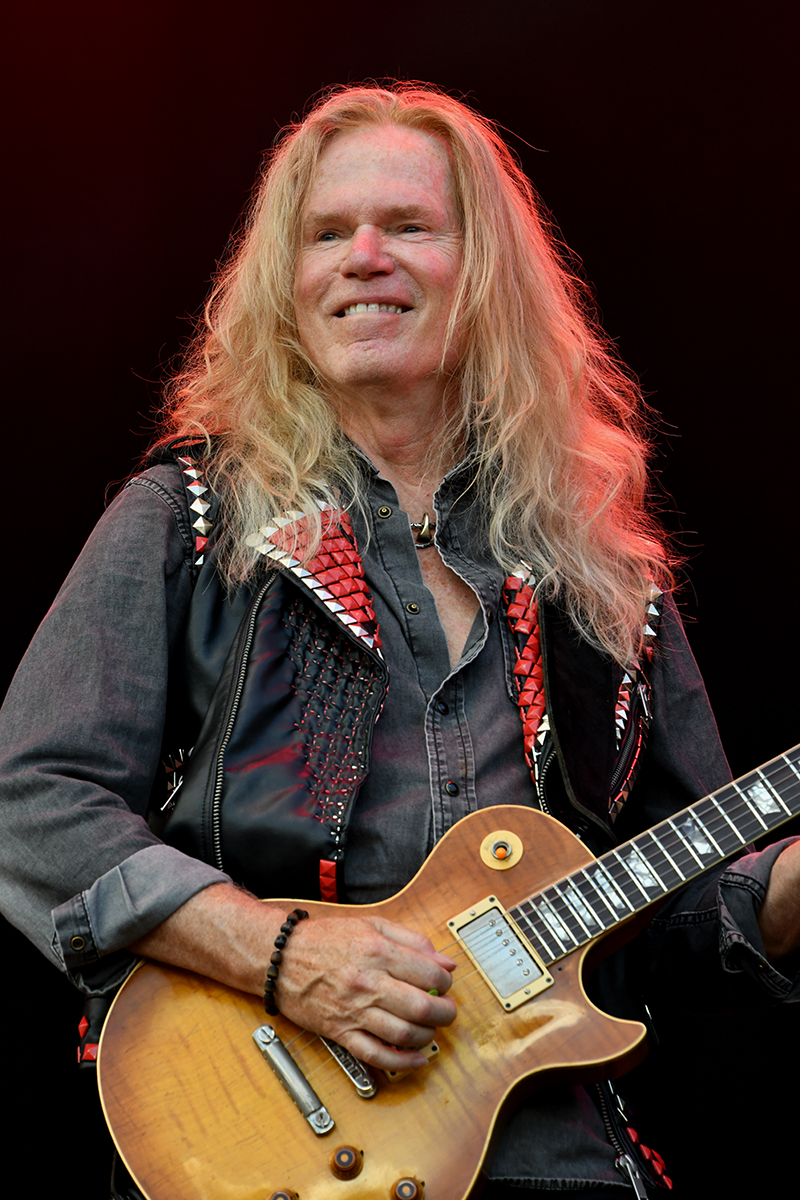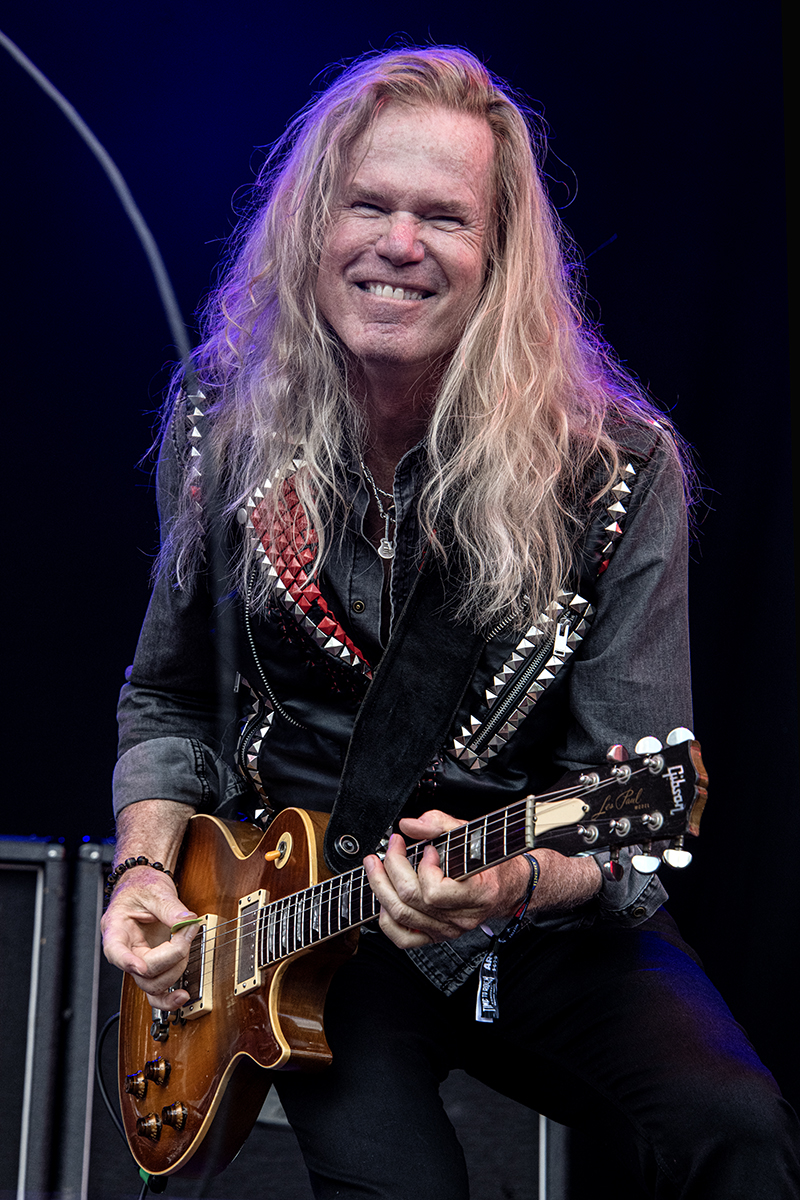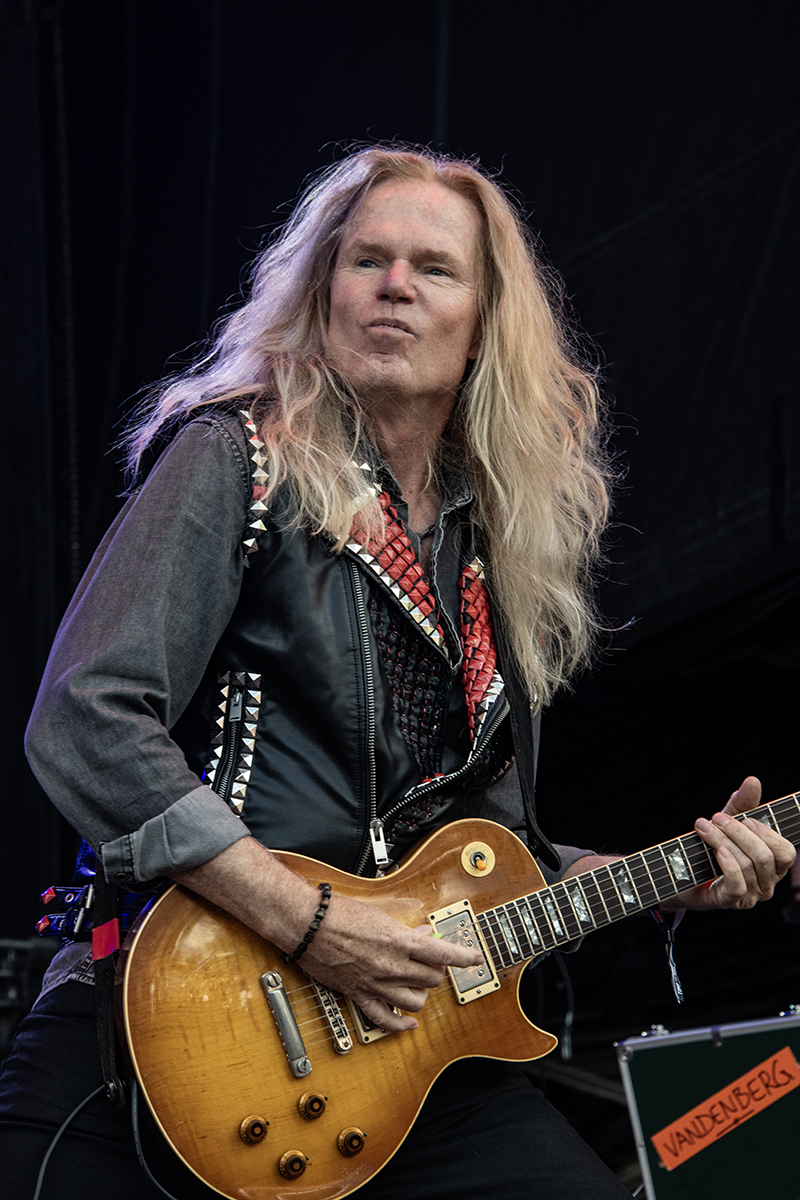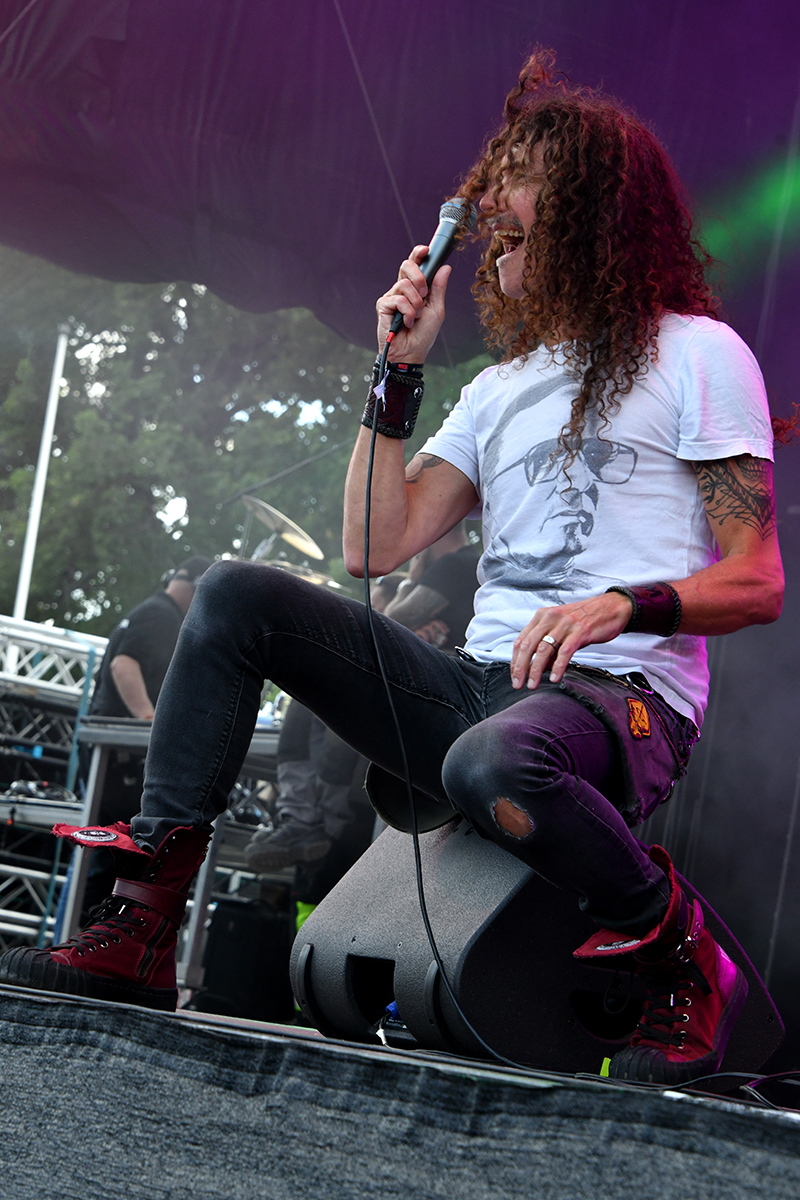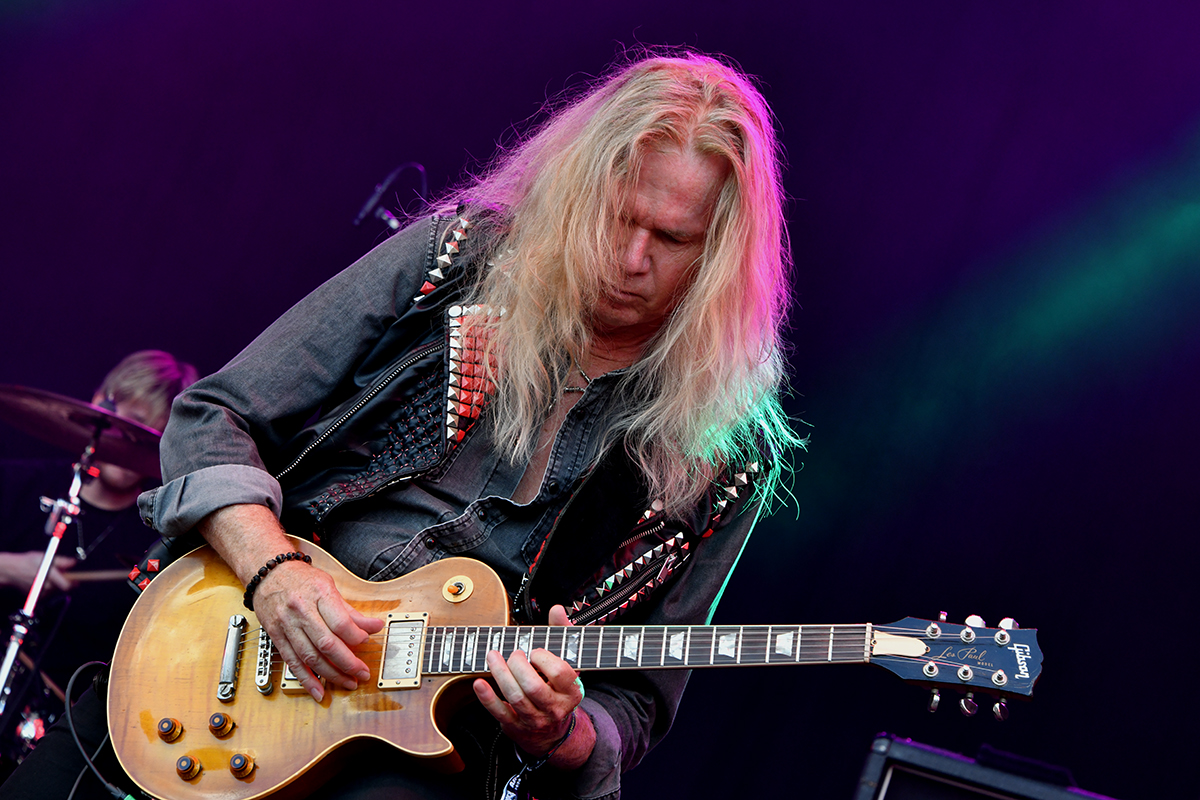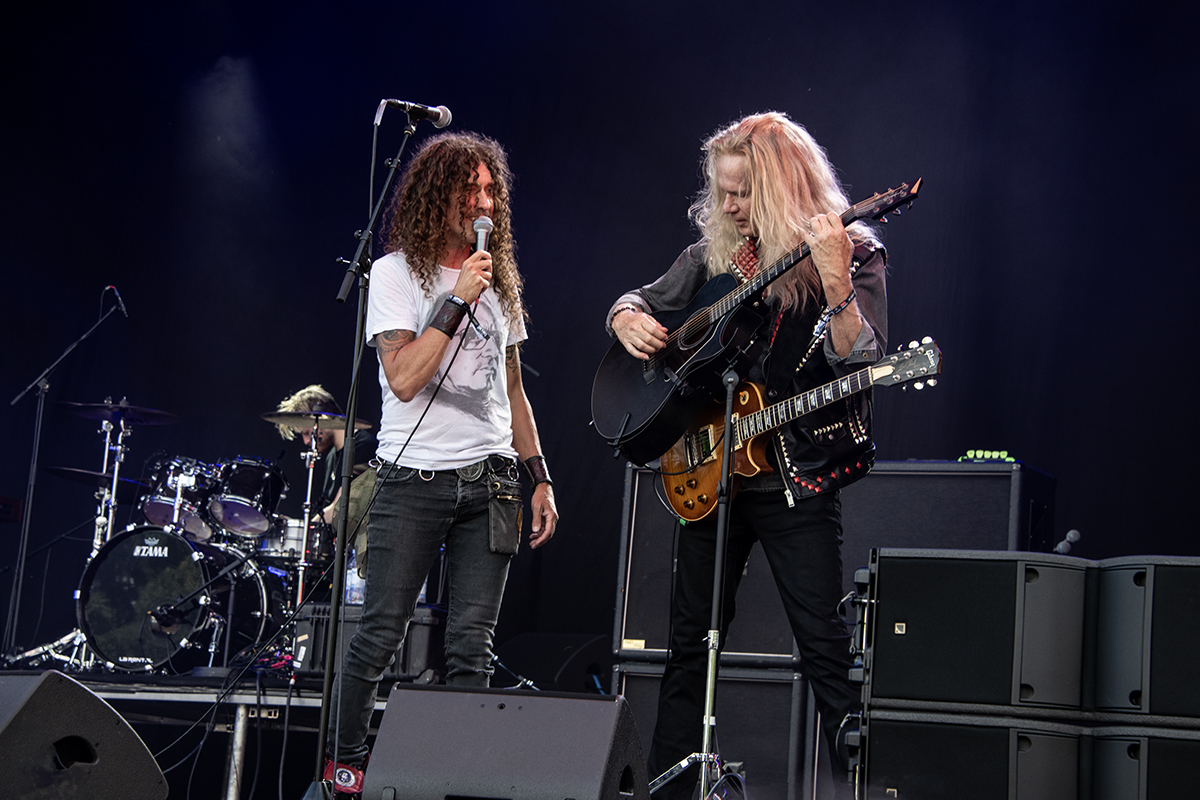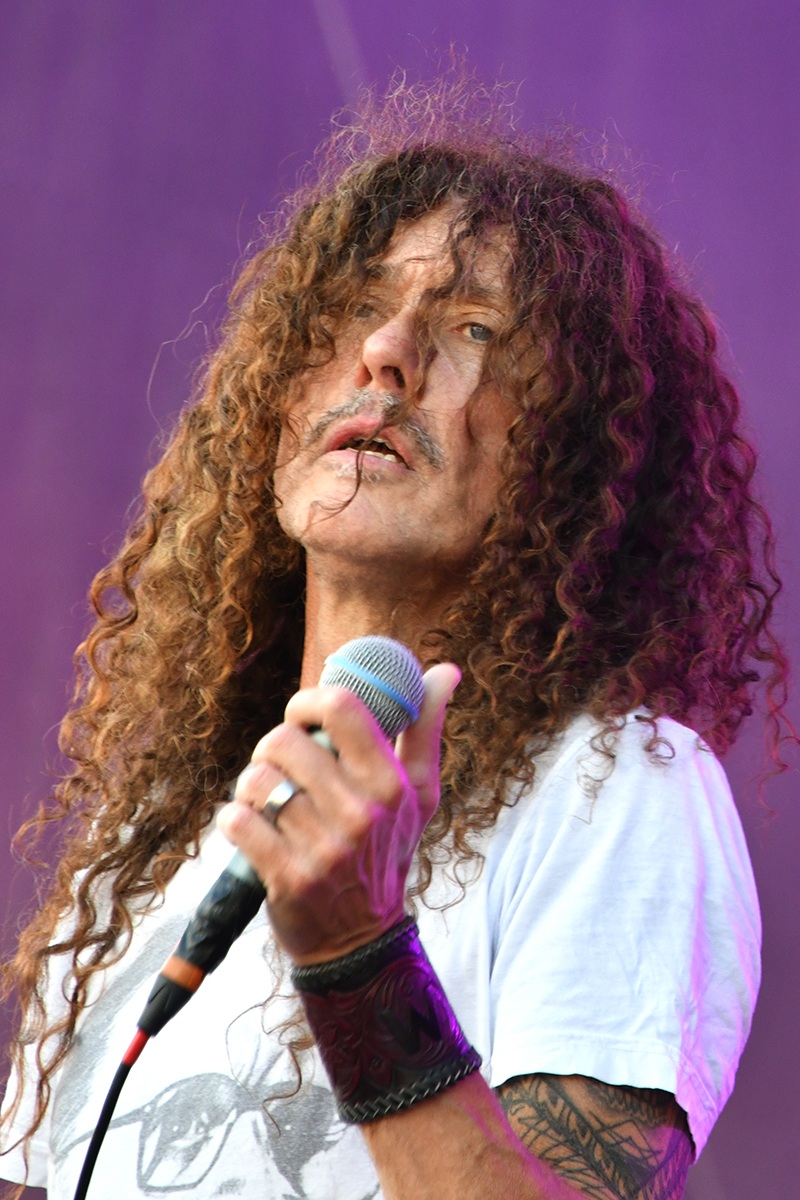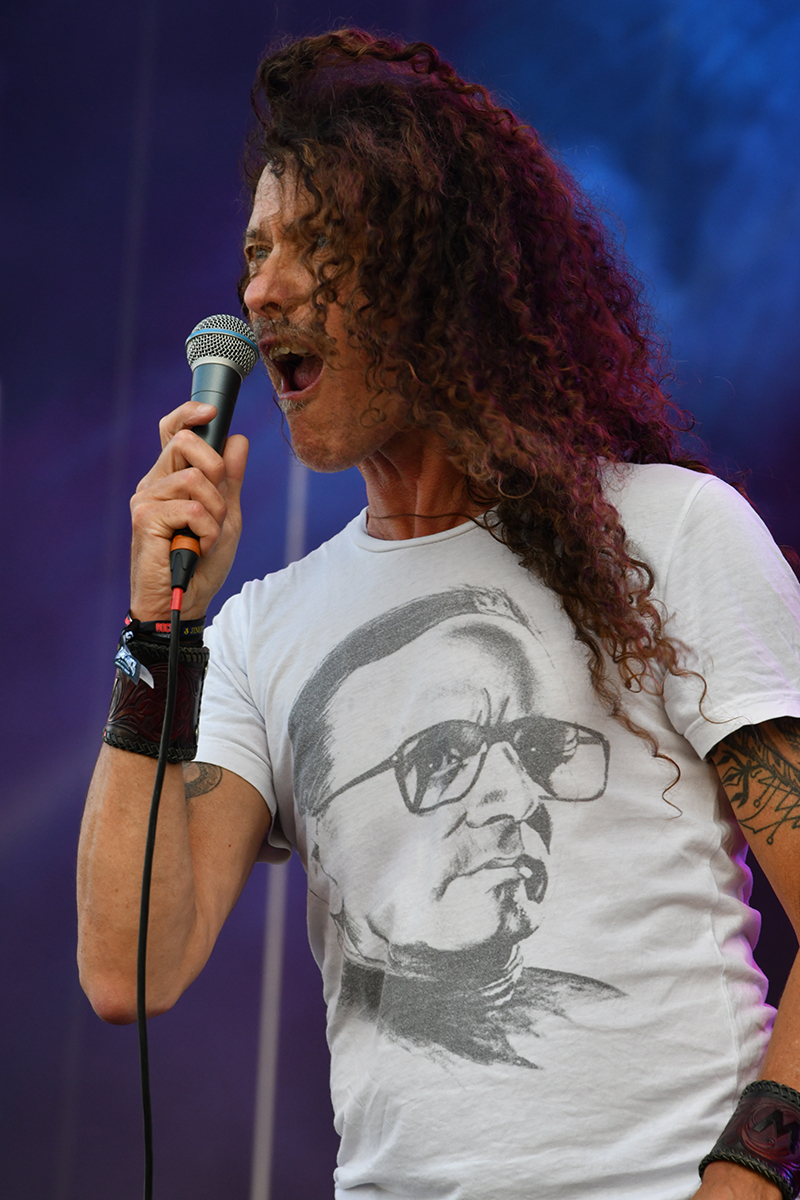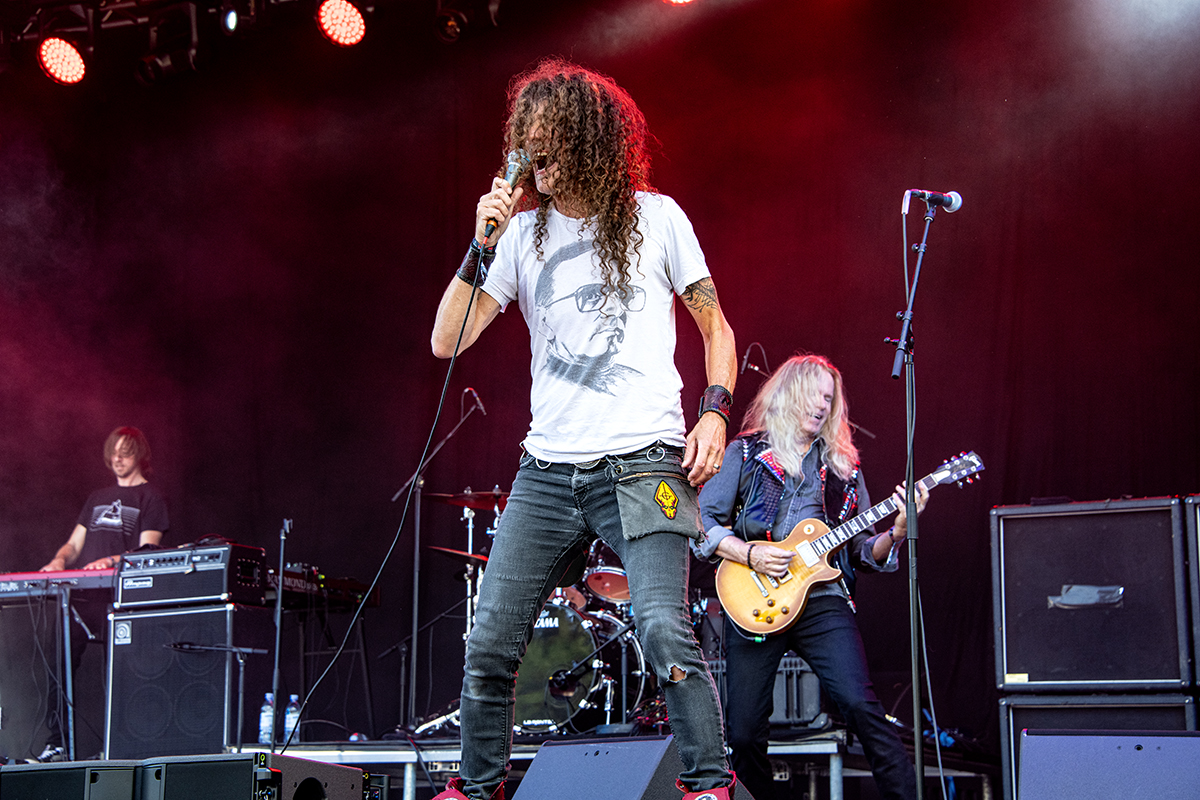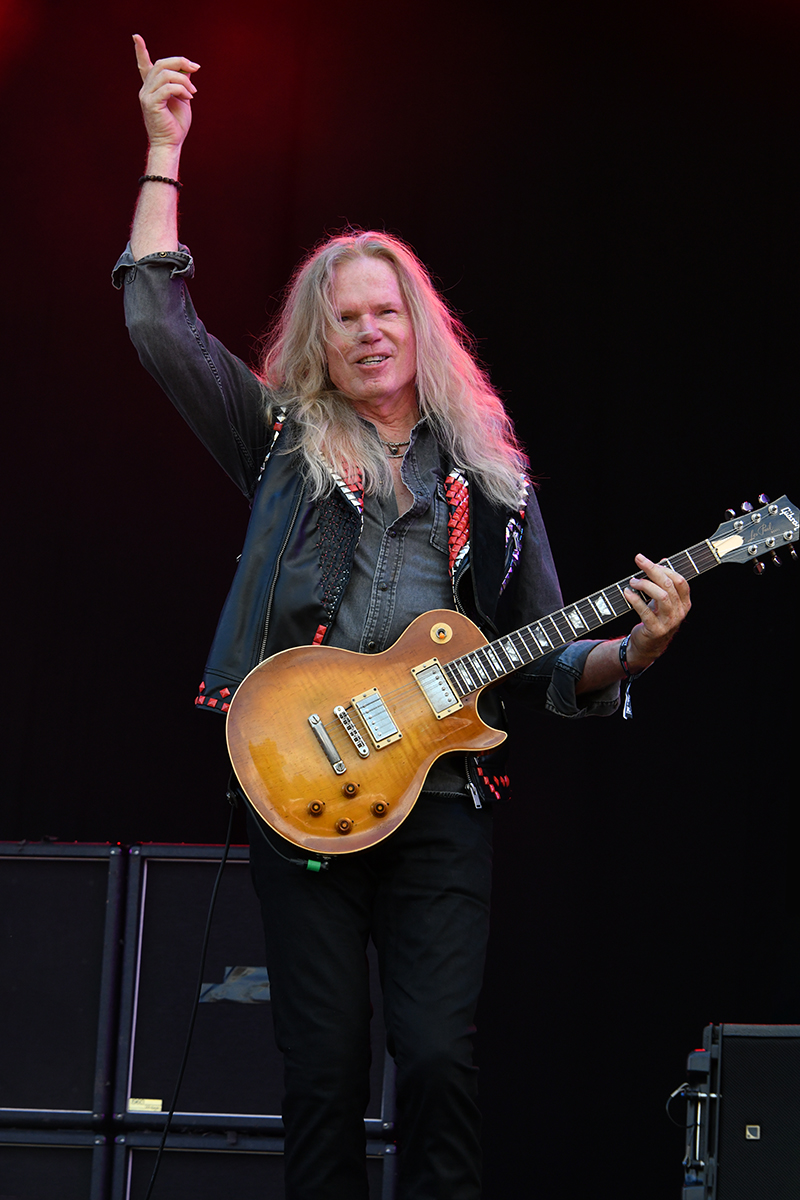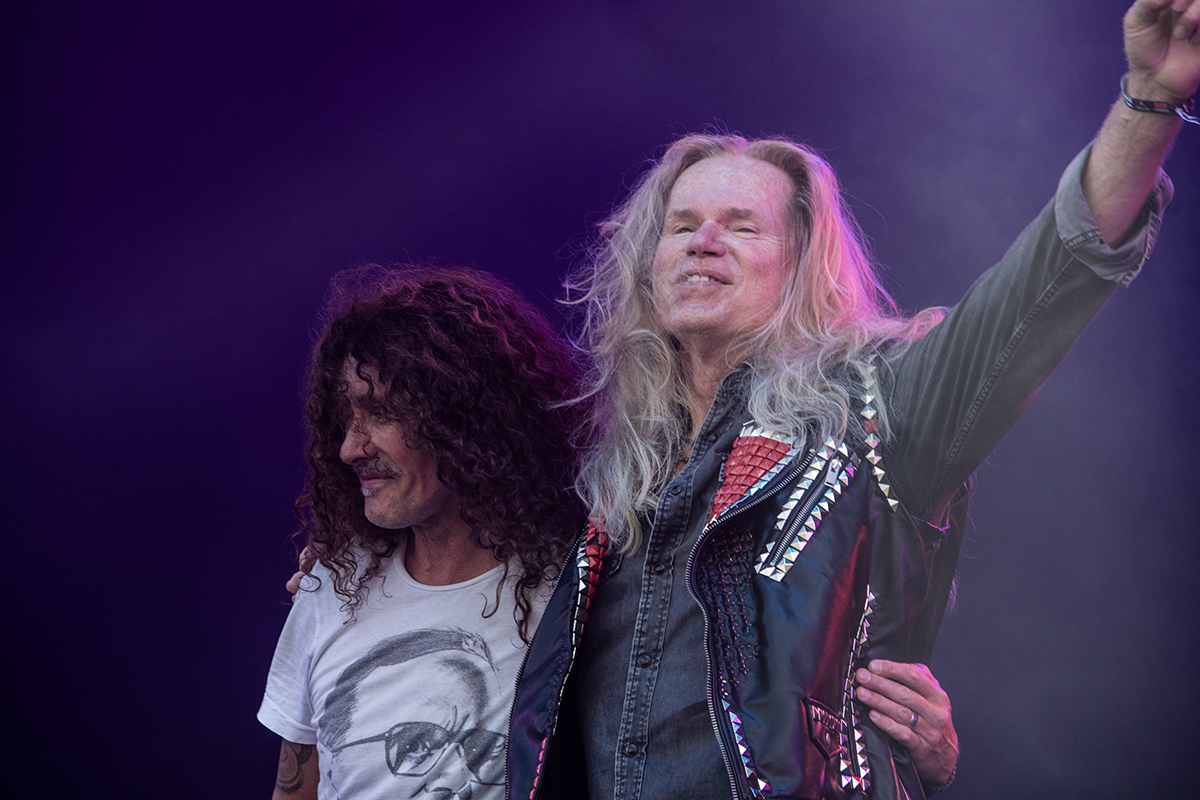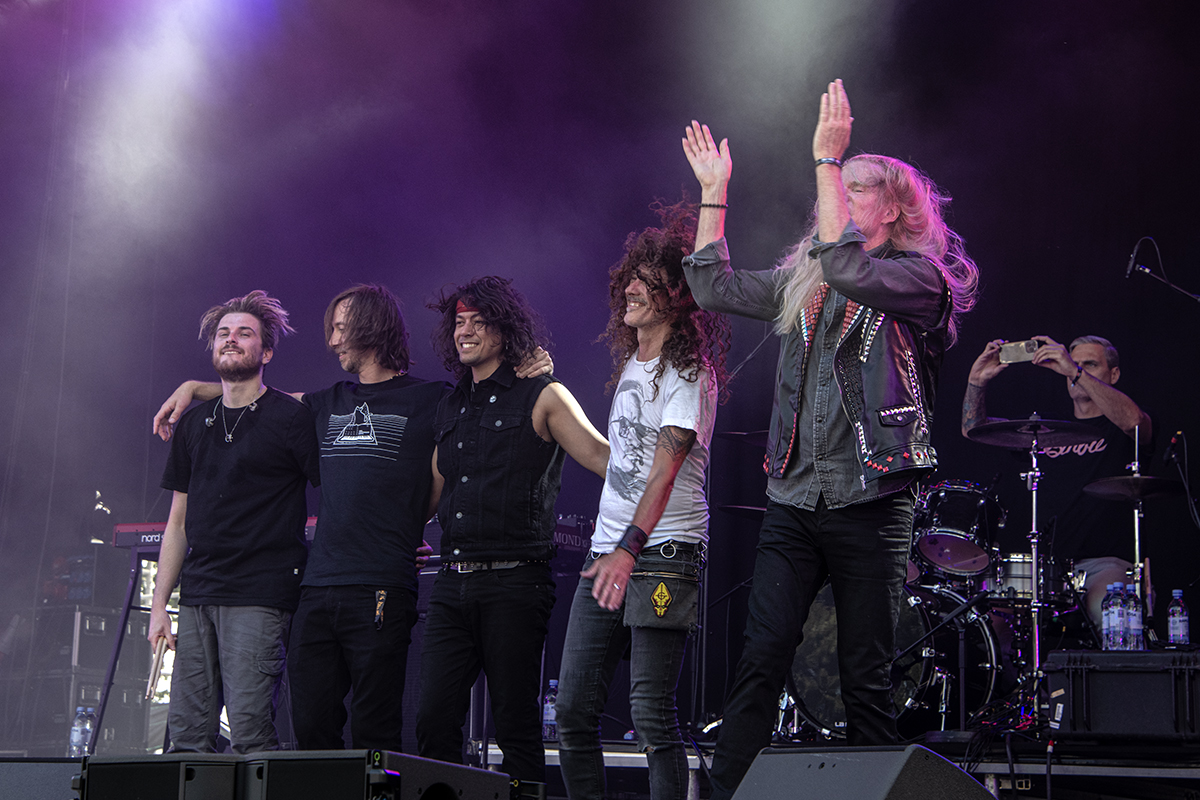Adrian Vandenberg is a Dutch rock guitarist best known for his tenure as the guitarist in Whitesnake during their successful late 80s period and the band Vandenberg, which he started in 1981. After a long hiatus from the music scene, Adrian formed a new band, Vandenberg’s MoonKings, in 2013 and recorded two studio albums with the band before reforming Vandenberg in 2019. Currently, the lineup consists of Vandenberg, vocalist Mats Leven, drummer Koen Herfst, and bassist Sem Christoffel. The band released its latest studio album, “Sin,” in August 2023. I met a cheerful Adrian a couple of weeks ago at the Time to Rock festival in Sweden, and we discussed various things, including the new Vandenberg lineup and album, Manic Eden, Adrian’s past work with Whitesnake, and his passion for art.
Adrian, it’s finally great to meet you again in person. I think the last time was in the late ’90s in Finland, which was close to 30 years ago.
Adrian Vandenberg: With Whitesnake?
That was the “Restless Heart” -tour.
Adrian Vandenberg: Yeah. I think the “Restless Heart” tour was in 1997.
THE RETURN OF VANDENBERG AND THE NEW ALBUM “SIN”
First, I want to congratulate you on the latest Vandenberg album, “Sin.” I think it’s one of the best hard rock albums released in years.
Adrian Vandenberg: Oh, thank you very much. Yeah, it was. I worked hard on that one. We all did, so it’s… Yeah, I’m really happy with it. For me, that’s the best thing I’ve done so far. And it got as close as possible to how I hear it in my head when I’m working on the songs. And then when you have musicians like Mats Leven and these other guys do to work with, then it takes a certain shape, and you go, man, I would have bought this record when I wasn’t in the band, but, yeah, I’m really happy with it. I’m very proud of it.
Vandenberg made a comeback in 2020 and released the album ‘2020.’ Ronnie Romero was the vocalist on that album, but I can say with my hand on my heart that this album is much better, and not least because of Mats’s incredible vocals
Adrian Vandenberg: Yeah, Mats is in a different league. The cool thing about Mats… Ronnie is a great singer. The interesting thing with Mats is that he goes really deep into his emotions. He doesn’t just sing it; he digs really deep, so to speak. And that’s what makes a great singer. That’s why people love guys like Coverdale, Plant, Dio, and all those guys; they dig deep into their souls to project what they’re feeling when they sing it. And that’s when it hits you in your heart. There’s quite a number of singers who are technically really, really good. They can hit all the high notes and stuff. And to me, it’s like guitar players who technically really were great, but I’d rather; personally, I’d rather hear a couple of notes that really hit me, like Jeff Beck does, for instance, often. Like Eddie Van Halen, it doesn’t have to do with speed for me; it’s like the soul. If you taste the soul in it or you hear the soul, you feel it, then it’s real music for me.
After Whitesnake disbanded in 1997, you took a long break from music and pursued other interests, such as art. What inspired you to return to music and form MoonKings in 2013?
Adrian Vandenberg: Well, it was a combination of things. In 1992, was it ’92? Yeah. I think it was ’92; my girlfriend I had a baby with, a baby girl. We split up because the relationship went wrong, which is quite logical because I was always on the road. And then, when you’re home for one or two years, you suddenly discover how the relationship is because we had been only together for a month before I joined Whitesnake.
Yeah, I had known her for a month before joining Whitesnake. We would see each other three or four times a year, and everything seemed fine. It’s common knowledge that living together is a whole different experience, and unfortunately, our relationship didn’t work out. For me, the situation was particularly difficult because of my daughter. I attempted to end the relationship several times but kept returning for my daughter’s sake. She was just a little girl, and the thought of leaving her was incredibly hard.
And at some point, I thought, well, I had to stick to the decision that the relationship doesn’t work. So then, I thought, I don’t want to be one of those daddies who is always away because my daughter didn’t live with me anymore. She lived with her mom. And I saw her, of course, as often as I could. But I thought, if I go on the road now, I’ll probably see her twice a year, and I couldn’t really do that. I didn’t want to do that, so I wanted to be a part of her life. So, I thought, “Okay, I’m going to stop making, touring and all this stuff until she’s old enough so I can explain to her what I actually do.” So, when she was about 12, that’s when we put together MoonKings, actually. And she thought it was pretty cool because, for her, it was normal that I made music. However, when the boys at her school said, ‘Oh, Adrian Vandenberg is your dad, how cool,’ she realized it wasn’t as ordinary as she thought. It was wonderful. She started coming to the shows with me, and she still does. She’s 25 now, and being there for her was the most important thing.
I also wanted to catch up on painting. It was also important, but my daughter was the most important thing. Then I thought, “Okay, I’m going to stop for her and pick it up again later.” You know, at some point, you have to have priorities in your life where you decide which is more important than that. You know, to me, that was. I missed that, too, because I was always able to combine it during the Vandenberg days. With Vandenberg, we usually played on the weekends unless we were on tour in the States or in Japan. But then, you get home, and then in Holland, you play two or three or four times a week. But the rest of Holland is so small, so you’re home every night. So, I could combine it, but as soon as I joined Whitesnake, I couldn’t combine it anymore because we were always on the road. So, I started missing the two. So, I decided to take a break for my daughter, which also gave me the chance to catch up with my painting.
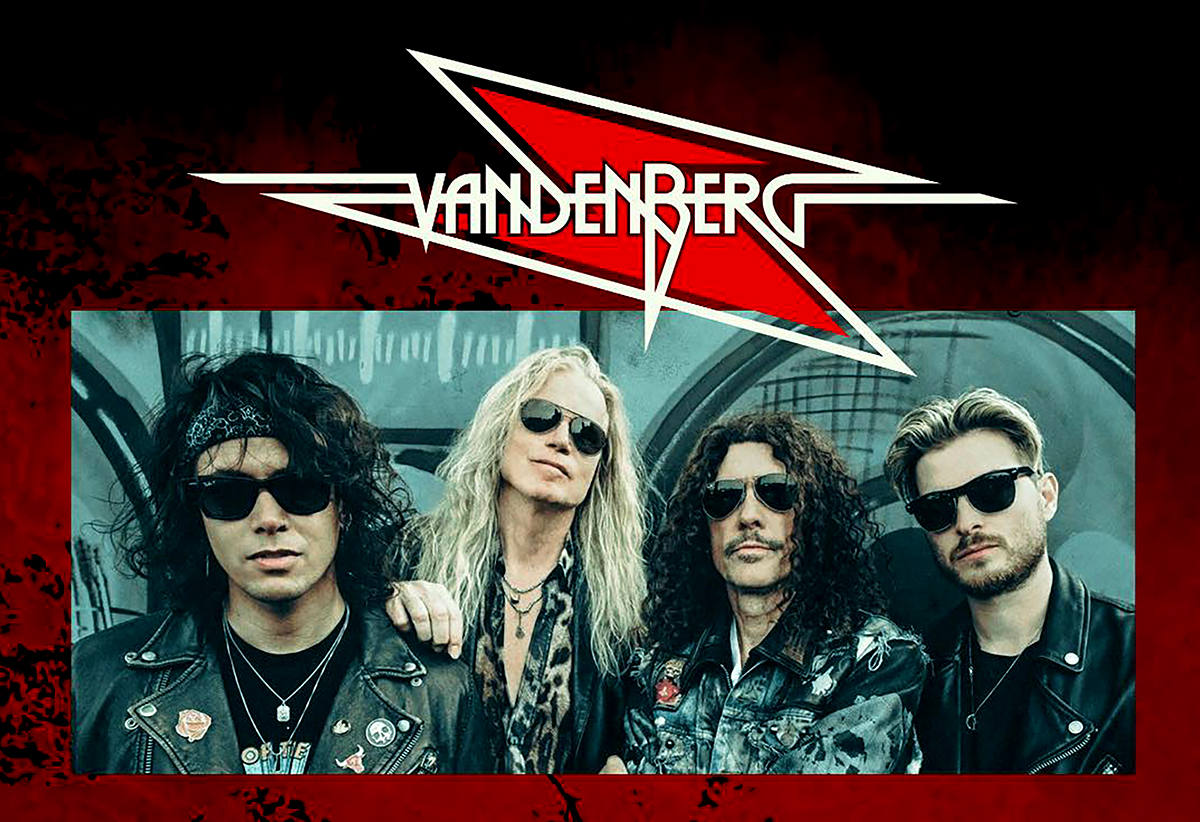
Are you still actively doing your art painting?
Adrian Vandenberg: Right now, I don’t have much time for it, but I made the painting for the “Sin” album, which was interesting because I hadn’t painted in that style since Vandenberg’s “Alibi” album in 1985. And I thought, like Pippi Longstock, I thought, “I have done it, so I think I can do it.” But it was a little bit more difficult than I thought. And there was a time… I had a deadline. So, normally, I would have gone on a couple of days longer because it was really difficult to get the sky to my liking. The sky alone took about three or four days to complete because it had to dry, and then I added another layer, which was quite complicated. But I wanted to have the northern light vibe. I thought it would be great to have the northern light behind New York, and then the sharks fly in. It was stressful because I only slept 3 hours a night for the last couple of days because I kept working until 1:00 or 2:00 at night. And at 05:00, I got up because there was a deadline. I had to leave for America. What was it, on Saturday or something? So, I needed to finish it in the middle of the night on Friday, so I did. I kept going and going, and a friend of mine picked it up the next day and handed it to the photographer while I was already on the airplane. I thought, “I hope everything works right,” because the record company needed it.
But it was worth all that work because the album cover looks great. It’s a great piece of art.
Adrian Vandenberg: Thanks. Thanks. It was.
I appreciate that some individuals like you still prefer the ‘old-school’ approach. Nowadays, over 99% of album artwork is crafted using Photoshop and AI. You’re among the few who remain true to the traditional methods, standing ‘last in line.’
Adrian Vandenberg: You don’t see that a lot anymore because everybody does stuff on Photoshop and AI and all that stuff. I think there will be a time very soon when people want to see handmade art and real music without all the stuff going on. But you can tell, you know? In a live show, I think you should hear mistakes. You should, because it’s live. Today, I made a bunch of them because we didn’t play for about a month, and I enjoyed it, you know? I thought, “Okay, how am I going to get away with this?” And the same goes with the rest of the band, because we didn’t rehearse. We had no time.
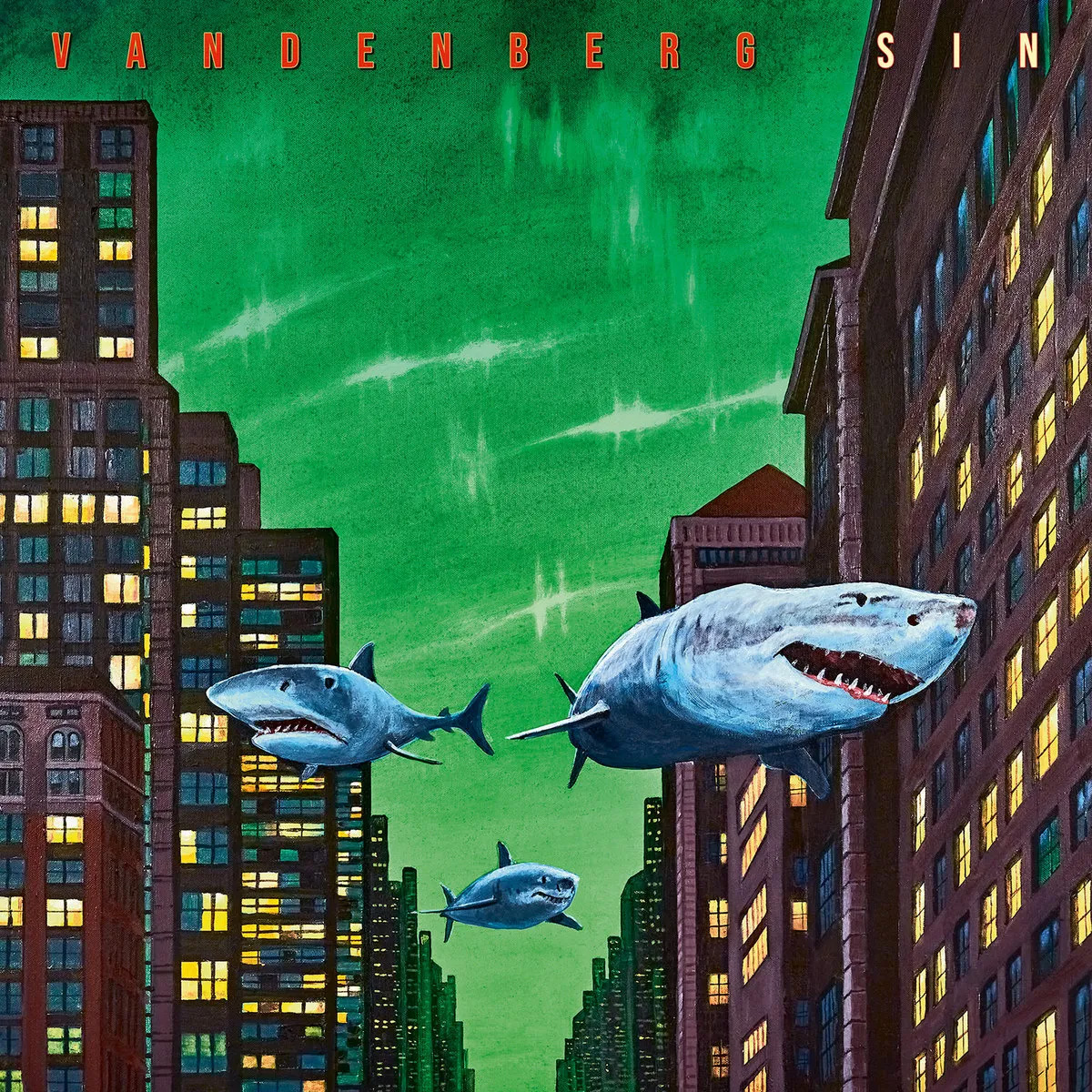
What’s the main concept behind this album’s cover art? It stands out from the usual covers in record stores and looks thoughtfully designed.
Adrian Vandenberg: Yeah. When I made that album cover, I thought, “How cool would it be to have flying sharks on it?” And I have always liked to paint an interesting sky, you know? So, the shark is like a scary animal. So especially when it flies towards you, it’s got this really mean face. I thought it does have some attitude, and then you have this peaceful desert. So, there’s a contrast, you know, between it. So, this time, I thought, how cool would it be to let the sharks fly into New York, which is also called the Apple? And then there’s the link with the apple and Adam and Eve, where the apple stands for, you know, “Don’t eat it,” and there is the snake. So, there’s a link between the snake and sin and then New York.
We’ve seen sharks before on Vandenberg’s album cover, so what’s the connection between the sharks and Vandenberg?
Adrian Vandenberg: That was for the “Heading for the Storm” album. I’ve always wanted to create paintings that depict very realistic scenes of events that can’t happen in reality.
But in those days, you didn’t have AI or Photoshop. So, in those days, I could make a painting that looked quite real, but it wasn’t possible. So right now, people are kind of used to that because there’s a lot of art that’s made in AI now, but also with Photoshop, people have been doing all kinds of stuff. So, I didn’t want to make it too perfect, so you could actually see that it’s made by hand because I can also paint where you can’t see the difference. Like the “Alibi” album with the crocodile, many people thought it was a photo and that it was like mounted and stuff. I thought, okay, now I’m going to do it a little bit looser, so you can actually see that it’s done by hand. Otherwise, it’s not fun, you know.
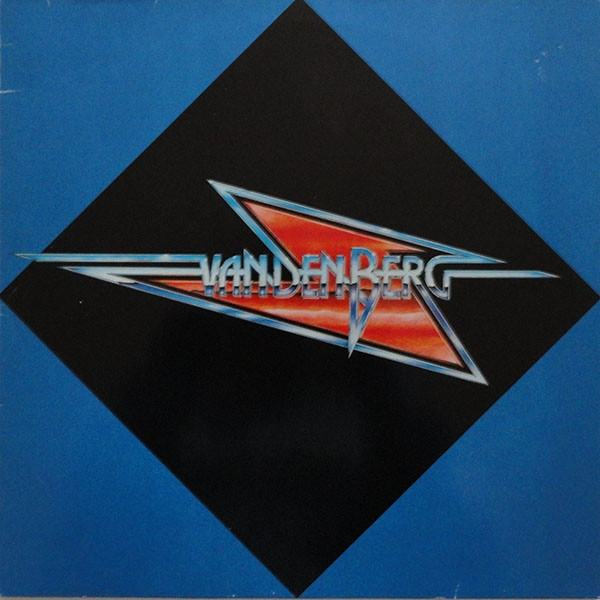
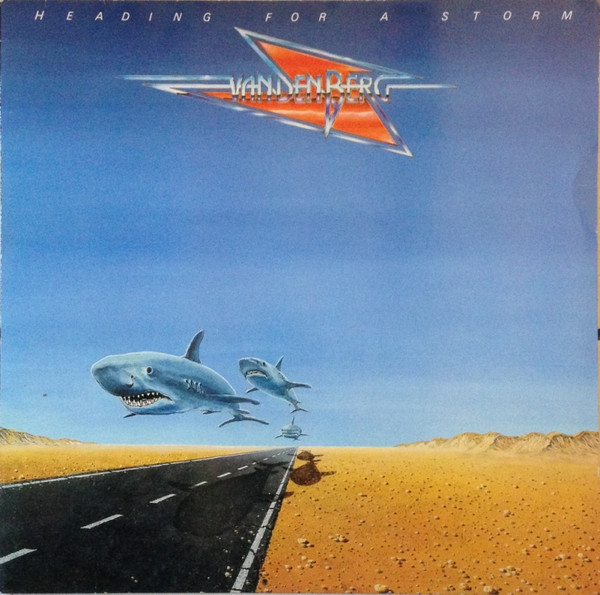
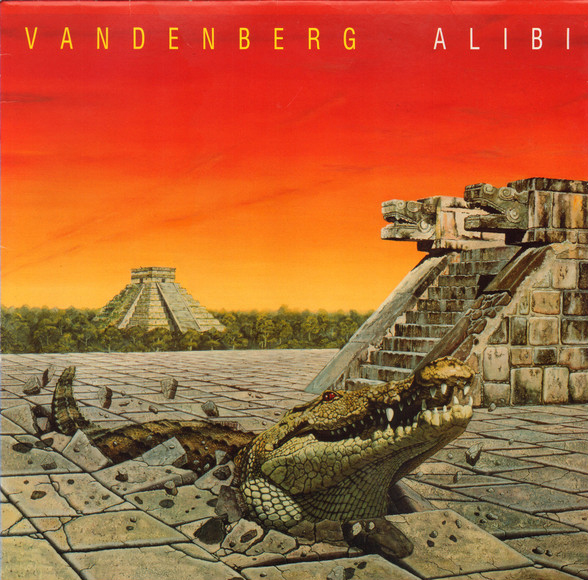
Let’s revisit 2014 when you decided to return and form MoonKings after a thirteen-year break from the music scene. The industry had undergone many changes during that time. How did you perceive and adapt to these changes, like the decline of traditional album sales and the rise of social media and streaming services?
Adrian Vandenberg: It was a big difference When I started up again with MoonKings, which was about 9 or 10 years ago or something. Coverdale said to me, “Man, you better be prepared because the business has changed a lot.” I said, “Well, I don’t care. I just want to play.” Because, sometimes, you make money, but very often, you don’t. Because, like, when we go on the road right now to fly over from Holland with eight people, stay in a hotel, and fly back, you know, you don’t really make any money, but another time you do. And so, for me, it’s always been up and down, but I’ve never done anything for money, and I don’t care as long as I can play.
Fortunately, I’ve been able to save money in my Whitesnake days. Otherwise, I wouldn’t be able to do this because it’s just ridiculous. The prices the bands got these days are pretty much the same as 30 years ago, but the expenses are five times more right now. The gas prices, the flights, the hotels, everything is really, really expensive. Every band has it really hard. I talked to my friend Steve Vai the other day, and he’s doing well with his tour. He said, “Man, it’s pretty hard, you know? I’m making okay money.” But he says, “At the same time, you have really high expenses.”
And he flies all over the world, of course, to do shows. And he plays for quite a lot of people. Every night, it’s like two or three thousand people or something. But you pay the band, and you fly, so. Yeah, but I always look at it like it’s the survival of the fittest, you know? It’s the survival of the people who really want to play. And you make a way. You make it work one way or another. Most of the musicians I know in Holland, their girlfriend or wife works also. But I know a whole bunch of great musicians in Holland, and they make about €3000 a month. But their wife or girlfriend works, and they can make it work, and they’re world-class musicians. It’s weird, you know, how that has changed. But like I said, I’m really happy I was there in the ’80s. Otherwise, I would have been an art teacher again. That was when I just got out of art college, you know? I taught art for about a year and a half, which was a lot of fun, but it’s not like playing in a Band Aid. “Laughs”
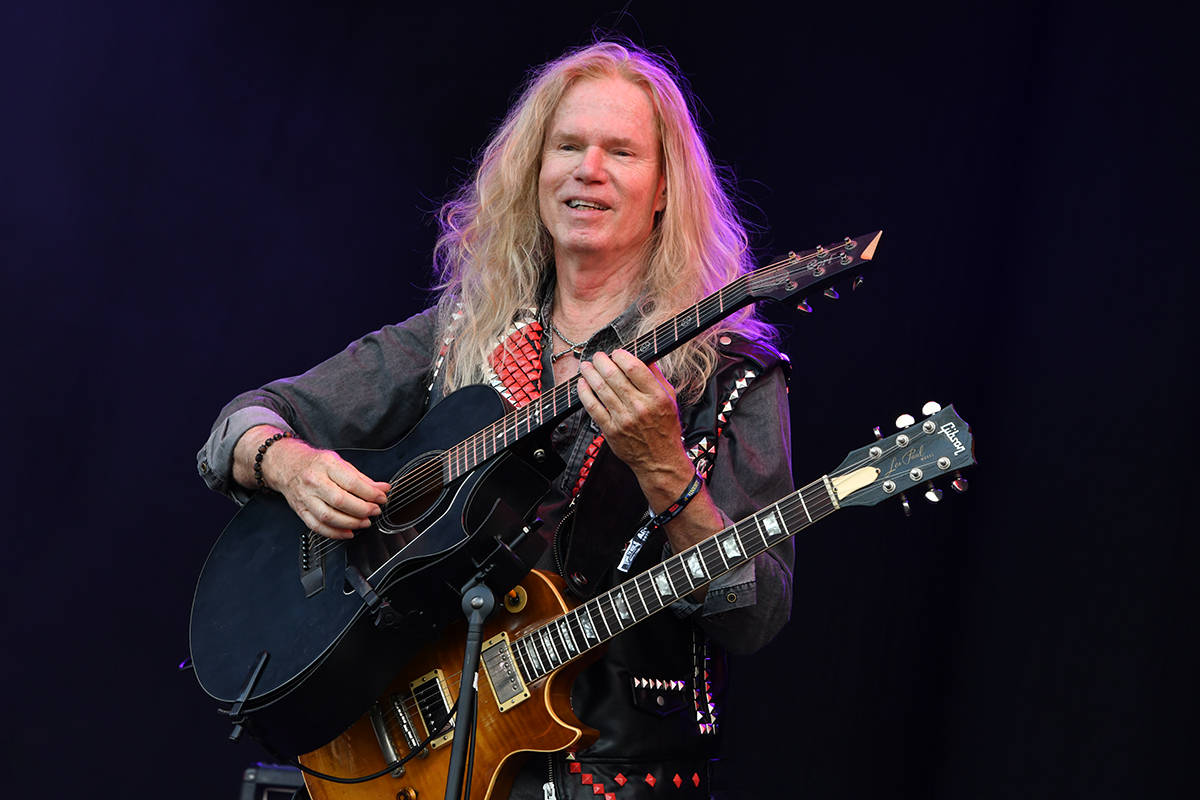
A couple of months ago, I met your old band colleague Rudy Sarzo in the UK, where he was playing some gigs with Quiet Riot.
Adrian Vandenberg: Oh, great. Rudy is a really good friend of mine, it’s great that he played in England again.
We had a great time and did a long interview there. One of the subjects we discussed was Manic Eden. I really liked the album you released in 1994, and now it has finally been re-released by Mascot Records. Could you tell me something more about that album?
Adrian Vandenberg: I’m really happy it got re-released. I’ve been telling the Mascot’s boss that it fits really well in the Mascot catalog of blues-rock stuff. I’m really happy it got re-released because we couldn’t tour then. And I always get a lot of messages and questions about, you know, where can I get that album? I only have one at home, so I don’t know. And it’s one of my favorite albums, especially because it’s very different from everything I’ve done. I was very much into my Stevie Ray Vaughan and Jimi Hendrix vibe of playing just a Stratocaster, and it makes you play differently. And it was great to play with Rudy, Tommy (Aldridge), and Ron (Young). You know, we recorded the album really quick, in about, I think, a week and a half or something. We were going on the road, but it was difficult because we had a different record company in every country. So, to get money together to tour was really, really hard. And at some point, David Coverdale called me up and said, “Yeah, I’m going to go tour again.”
Yeah, you and Rudy then re-joined Whitesnake for the “Greatest Hits” -tour and Manic Eden was done.
Adrian Vandenberg: Yeah. I thought, “Well, if I’m not going to record an album with David again,” then I must have been with Whitesnake for about six years. I haven’t played on an album because, with the “Slip of the Tongue” album, I had this wrist problem, which is why I play with my nails now: because the pick kind of flips all over the place. So, I do the rhythm parts with a pick, which is fine because it’s different. But with the solos, I throw the pick away, and I had to play them with my nails like this, but it’s fine. But yeah, it was a pity we didn’t tour with Manic Eden because we would have loved to… It was a weird time. It was 1994, and grunge was the biggest thing.
Everybody was walking around in cutoff jeans and Doc Martens shoes, and everybody thought, you know. All the ’80s guys that I knew thought, “Oh, fuck, what’s going on now?” So, they suddenly changed their image, and that never works, you know. Look at AC/DC. They just stuck to their guns. And it always goes like this. I mean, life goes like this. You know, you have your ups and downs, and things change. And it’s like this John Lennon quote, which stayed with me my whole life. It says, “Life is what happens to you while making other plans.” So, you make this plan, and then something changes. You go, “Oh, wait. Oh, I gotta make a new plan?” You make the new plan, do it, and then something else changes.
“Here I go again.” “Laughs”
Adrian Vandenberg: Right, yeah, “Here I go again.” So, I kind of enjoy it. It’s like surfing through life, you know? You go with the, you go with the roll with the punches and go with the waves. And that’s the way it should be, I suppose. Otherwise, it becomes predictable.
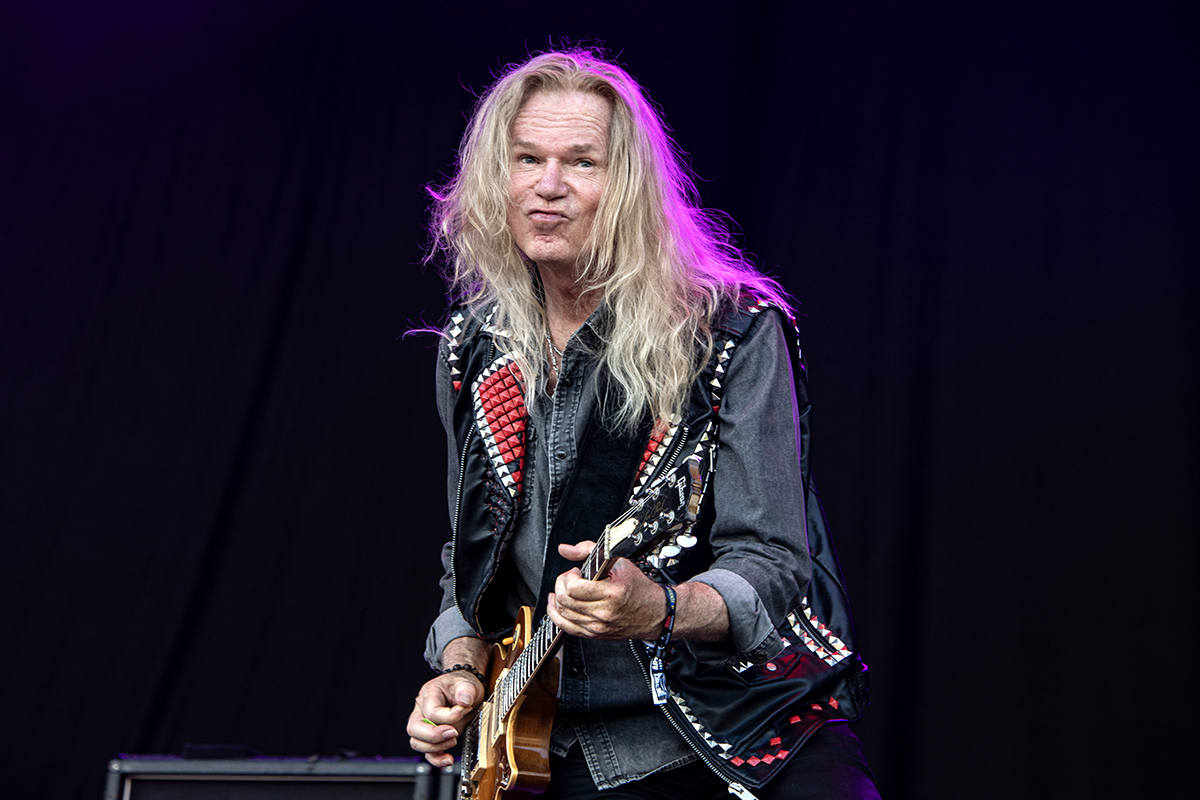
In 1997, you finally recorded an album with Whitesnake, “Restless Heart,” which became the band’s last album before retirement. A farewell tour followed, and I remember that the tour also reached Finland since I was there. What memories do you have from that tour?
Adrian Vandenberg: It was just… I always enjoyed playing, but it was a little bit of a strange tour. You know, the lineup, of course, was very different. The times were very different. So, in certain countries, it went great, like South America, where people went nuts. In other countries, people wanted to hear the “1987” album. But in England, England has always been very, very split up. There are a lot of Whitesnake fans who say, “The best lineup is with Micky Moody and Bernie Marsden.” And the other guys go, “No, the best lineup is with John Sykes.” No, the best lineup, you know, it’s like with Van Halen. “No, Sammy Hagar is better singing than David Lee Roth.” No, no.I don’t know why people do that. I always think, “Come on, man, you like the band, or you don’t.” And things change, you know? It’s like if you like Queen’s music, you go to Queen, and you see Adam Lambert singing those songs. And it’s not the same because nobody will ever be the same as Freddie, but still, you get to hear the music live, so fuck it, you know? So, the same thing was a little bit on the tour because you could tell that people were expecting something like a big pompous “1987” sound in some countries.
I remember that on the show you played in Helsinki on that tour, the former Mr. Mister guy, Steve Farris, played the other guitar, Tony Franklin played bass, and the guy from Montrose and Heart played the drums.
Adrian Vandenberg: Denny Carmassi. Yeah, he’s one of my best friends, Denny Carmassi. He is one of my best friends ever. Great drummer. But, of course, he’s the opposite of Tommy Aldridge. But he got his groove. He’s like a Rolex watch, you know? He just keeps going. “Bam, bam, bam.” So, I really enjoyed every tour. And with Denny, we had a lot of fun on that tour. Very surreal experiences in some weird cities, you know. So, I have great memories of the tour. And it was different, you know, playing with Denny. And I really like the bass player, Tony Franklin. So that was a blast. We toured South America and played Russia, which will probably never happen again, you know, the way it goes in the world. At least it’s not gonna happen in our lifetime, I think, because it’s a strange world we live in right now.
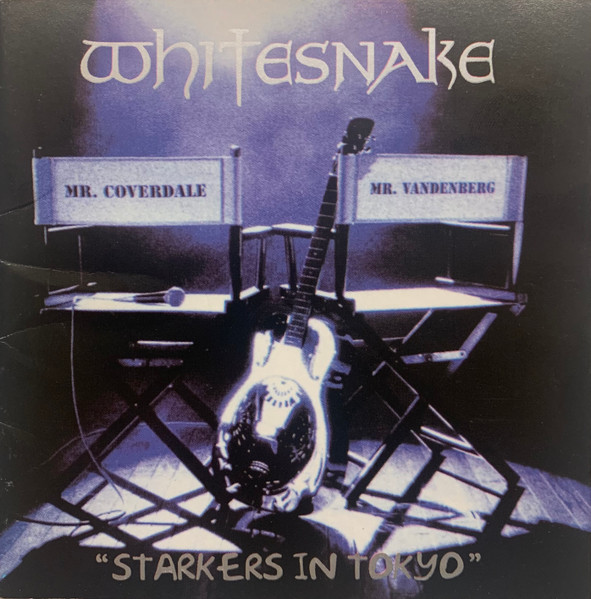
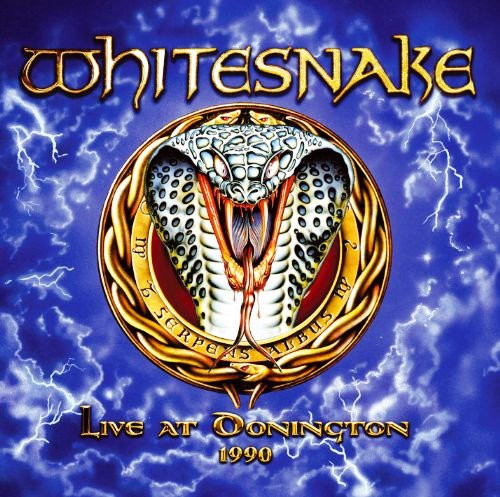
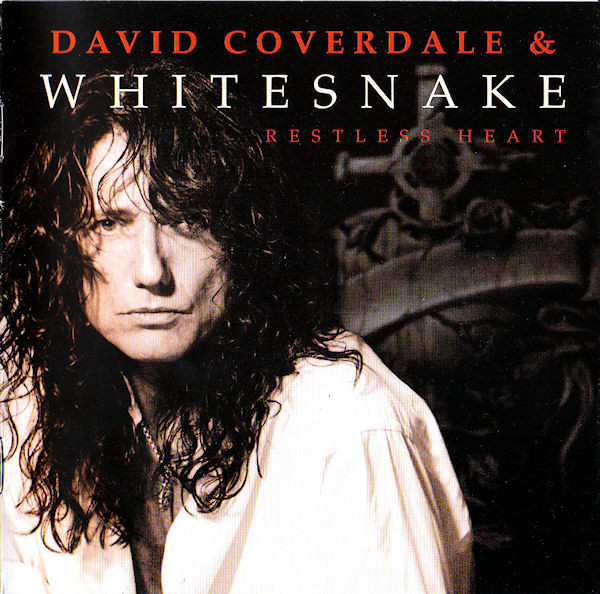
There is a rumor that David Coverdale is going to record another album, which would also include some of the former members of the band. Have you heard of this?
Adrian Vandenberg: I’ve heard that rumor, too, but I haven’t heard it from him. I talk to David every once in a while, you know? He’s never mentioned it, so we have yet to see. I don’t know, and it really depends on what we are doing with this band because I think we have a killer band. And I think… I don’t know if I’m not touring or recording, but it could be fun for a certain period of time. At the same time, I think, “Who’s going to sing?” I don’t know. Well, when I talk to David, he still has his voice. So maybe at home, in a studio, or a controlled environment, he can do it. I don’t know. Or maybe he’s going to do like Bon Jovi and get an operation or something. I don’t know. So, we’ll see. You know, I take it as it comes, like always.
But if he asked you, and the timing was right, would you consider working with David again?
Adrian Vandenberg: If there were time, and I wouldn’t be doing something with this band. Because I love this band, this is my favorite band. And, you know, Koen (Herfst), you’ve seen him. He’s like a young Tommy Aldridge. Sem (Christoffel) is probably my favorite bass player. He’s like a young Rudy Sarzo if you see him on stage, actually. But Sam is… Sam played with me in MoonKings, and he’s so talented. And, of course, Mats is unbelievable. So, in the last couple of shows on the last American tour, we had Len with us, the keyboard player, and I really liked playing that too. It’s a wider sound, and with those Whitesnake songs, and with every song, actually, it’s really great to have a guy like Len with us, too. So, I’m so happy with the band, which you can probably see because I’m smiling all the time, you know? I’m just having a great time, so it’s all good.
Can I ask what kind of deal you have with Mats? I mean, he’s always busy with other bands as well. Is he a permanent singer in your band?
Adrian Vandenberg: Oh, Mats is the singer of this band. He said so, too. I mean, we know that. When I called him up two years ago, he said, ‘Man, I’m so glad you called because when…’ When he read that I was putting MoonKings together about nine years ago, he said, ‘I was a little bit pissed off because I wanted to work with you.’ Yeah. And he told me that when he was 22 or something, he asked his mom if she could bring him the first Vandenberg albums with her. She was in England, and he couldn’t get it in Stockholm, where he lived at the time. Or he didn’t live in Stockholm; he lived in… was it again on the coast in Sweden?
Do you mean Gothenburg?
Adrian Vandenberg: Yeah, Gothenburg. And he couldn’t find those albums there, so his mom brought them for him. So, he knew all the songs, you know? And he said, ‘Oh, I’m really happy!’ So, it was great. We’re having a great time. We just toured America. Of course, everybody knows he has to do a lot of stuff with other bands because he’s a professional vocalist. So, I talked to a journalist this week, and he said, ‘I saw Mats three times in the last two weeks because he played shows with one of his other bands, Prince Svarts, so here we go.’ Laughs”
Your manager seems to think we must wrap up this interesting discussion now. But I want to thank you for doing this, and hopefully, there will be plenty more Vandenberg albums and tours in the future!
Adrian Vandenberg: Thank you, Marko.
WEBLINKS
OFFICIAL VANDENBERG FACEBOOK PAGE
VANDENBERG LIVE AT TIME TO ROCK FESTIVAL 2024
